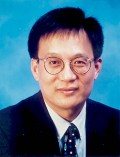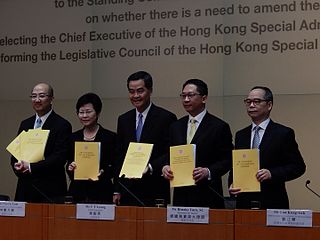
The Democratic Alliance for the Betterment and Progress of Hong Kong (DAB) is a pro-Beijing conservative political party registered since 1992 in Hong Kong. Chaired by Gary Chan and holding 13 Legislative Council seats, it is currently the largest party in the legislature and in terms of membership, far ahead of other parties. It has been a key supporting force to the SAR administration and the central government's policies on Hong Kong.

The Hong Kong Federation of Trade Unions (HKFTU) is a pro-Beijing labour and political group established in 1948 in Hong Kong. It is the oldest and largest labour group in Hong Kong with over 420,000 members in 253 affiliates and associated trade unions. Presided by Ng Chau-pei and chaired by Kingsley Wong, it currently holds four seats in the Legislative Council and 43 seats in the District Councils.

The 2004 Hong Kong Legislative Council election was held on 12 September 2004 for members of the Legislative Council of Hong Kong (LegCo). The election returned 30 members from directly elected geographical constituencies and 30 members from functional constituencies, of which 11 were unopposed.

Elections in Hong Kong take place when certain political offices in the government need to be filled. Hong Kong has a multi-party system, with numerous parties in the Legislative Council. The Chief Executive of Hong Kong is nonpartisan but has to work with several parties to form a coalition government.

Legislative elections are held in Hong Kong every four years Legislative Council (LegCo) in accordance with Article 69 of the Basic Law. Legislative elections are held either at the expiry of a four-year term or when the Chief Executive dissolves the legislature and calls a new election.

The 2008 Hong Kong Legislative Council election was held on 7 September 2008 for the 4th Legislative Council since the establishment of the Hong Kong Special Administrative Region. There were 60 seats in the 4th Legislative Council, with 30 members elected by geographical constituencies through direct elections, and 30 members by functional constituencies. Candidates for 14 functional constituency seats were unopposed.

Democracy in Hong Kong has been increasing until the transfer of sovereignty to the People's Republic of China in 1997 and declining since. The one country, two systems principle allows Hong Kong to enjoy high autonomy in all areas besides foreign relations and defence, which are responsibilities of the central government. Hong Kong's Basic Law, also adopted after the 1997 handover, allowed residents to vote for local district councillors and directly elect about half of the region's legislators at the time. Many Hongkongers became concerned, however, after the first Chief Executive, Tung Chee-hwa, appeared to have mishandled this issue, while human rights and universal suffrage have also become focal points for the pro-democracy camp.

The pro-Beijing camp, pro-establishment camp or pro-China camp is a political alignment in Hong Kong which generally supports the policies of the Beijing central government and the Chinese Communist Party (CCP) towards Hong Kong. The term "pro-establishment camp" is regularly in use to label the broader segment of the Hong Kong political arena which has the closer relationship with the establishment, namely the governments of the People's Republic of China (PRC) and the Hong Kong Special Administrative Region (HKSAR). Pro-Beijing politicians are labeled "patriots" by pro-Beijing media and "loyalists" by the rival pro-democracy camp.
The 2010 Hong Kong electoral reform was the series of events began in 2009 and finalised in 2010 under the Consultation Document on the Methods for Selecting the Chief Executive and for Forming the Legislative Council in 2012, a document published on 18 November 2009 by the Government of Hong Kong to broaden the scope of political participation and increase the democratic elements in the 2012 elections in line with the Hong Kong Basic Law.

The 1991 Hong Kong Legislative Council election was held for members of the Legislative Council of Hong Kong (LegCo). The election of the members of functional constituencies was held on 12 September 1991 and the election of geographical constituency seats was held on 15 September respectively. It was the first ever direct election of the Legislative Council in Hong Kong history. There were 18 members from directly elected geographical constituencies, 21 members from functional constituencies, 17 members appointed by the Governor, and 3 official members.
The 1988 Hong Kong Legislative Council election was an indirect election for members of the Legislative Council of Hong Kong (LegCo); was held on 22 September 1988. It was the second ever election of the Legislative Council in Hong Kong history based on the 1987 Review of Developments in Representative Government, as the Government's democratisation process according to the agreement of the Sino-British Joint Declaration. There were 12 members elected by Electoral Colleges, 14 members from functional constituencies.

The 1994 Hong Kong electoral reform was a set of significant constitutional changes in the last years of British colonial rule in Hong Kong before the handover of its sovereignty to the People's Republic of China (PRC) on 1 July 1997. The reform aimed at broadening the electorate base of the three-tiers elections in 1994 and 1995, namely the 1994 District Board elections, the 1995 Urban and Regional Council elections and the 1995 Legislative Council election. It was the flagship policy of the last colonial governor Chris Patten.

The Legislative Council (Amendment) Ordinance 2012 is an ordinance of the Legislative Council of Hong Kong. It amends the Legislative Council Ordinance Cap. 542 § 39 to disqualify a resigned member of the Legislative Council from participating in a subsequent by-election. The original proposal was to avoid by-elections but it sparked vast controversies in the community. The revised ordinance restricts a resigned member of the Legislative Council from standing in any by-elections within six months.
The 1985 Hong Kong electoral reform introduced the first ever indirect election to the colonial legislature during the last years of the British colonial rule in Hong Kong. The reform proposals was first carried out in the Green Paper: the Further Development of Representative Government in Hong Kong in July 1984 right before the Sino-British Joint Declaration in December. The reform laid the foundation of the representative democracy in Hong Kong which developed throughout the last years of the colonial rule and succeeded by the democratic development in Hong Kong after the handover of Hong Kong in 1997.

The 2014–2015 Hong Kong electoral reform was a proposed reform for the 2017 Hong Kong Chief Executive election and 2016 Legislative Council election.
The Hong Kong Special Administrative Region Basic Law Drafting Committee (BLDC) was formed in June 1985 for the drafts of the Hong Kong Basic Law for the Hong Kong Special Administrative Region (HKSAR) after 1997. It was formed as a working group under the National People's Congress. The Drafting Committee had 59 members, of whom 23 were from Hong Kong and 36 were from Mainland, mostly the PRC government officials. The Drafting Committee was dominated by Hong Kong businessmen with a share from different social sectors. The decisions of the Drafting Committee on the political structure and legal system of the HKSAR had a great impact on the politics of Hong Kong today.

The 2015 Hong Kong District Council elections were held on 22 November 2015. Elections were held to all 18 District Councils with returning 431 members from directly elected constituencies after all appointed seats had been abolished.

The pro-Republic of China camp, or the pro-Kuomintang camp (親國民黨派), is a political alignment in Hong Kong. It generally pledges allegiance to the Republic of China (ROC) in Taiwan and the Kuomintang.

The 2021 Hong Kong electoral changes were initiated by the National People's Congress (NPC) on 11 March 2021 to "amend electoral rules and improve the electoral system" of the Hong Kong Special Administrative Region (HKSAR) for its Chief Executive (CE) and the Legislative Council (LegCo), in order to ensure a system in which only "patriots", according to the Chinese definition, govern Hong Kong. The reforms have been widely criticized for their negative impact on the democratic representation in the Hong Kong legislature.
A by-election was held for the Election Committee constituency in the Legislative Council of Hong Kong on 18 December 2022 after resignation of four Legislative Councillors appointed to the new government led by Chief Executive John Lee Ka-chiu.












